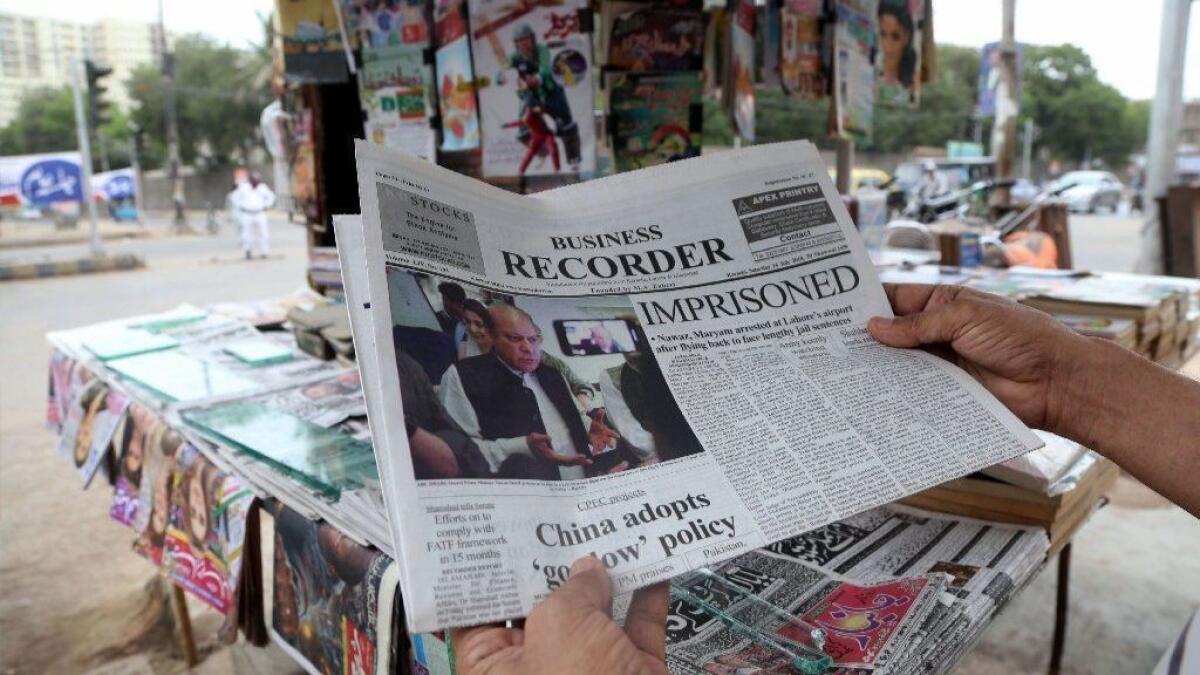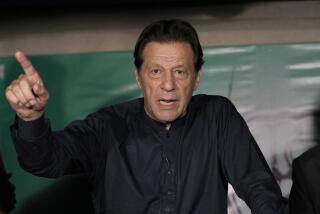As Pakistan prepares for elections, its powerful military appears to be meddling

Reporting from Islamabad, Pakistan — Five years ago, one elected government in Pakistan stepped down to make way for another, marking the first peaceful democratic transition in a country that has been under military rule for much of its independent history.
Now Pakistan is attempting to repeat the feat. But the run-up to July 25 elections suggests that its powerful army is not done interfering in politics.
Although the military generals are loath to retake power themselves — risking U.S. and international sanctions that could jeopardize their economic interests — analysts say they appear determined to keep former Prime Minister Nawaz Sharif out of politics.
Sharif, a longtime adversary of the generals who was removed from office last year on corruption charges, was convicted on flimsy evidence this month and sits in jail. Leading members of his party have been defecting in recent weeks to join his main rival. A news channel whose coverage was sympathetic to Sharif was mysteriously forced off the air, and rallies by his supporters have been blocked or subjected to media blackouts.
To many Pakistanis, the pattern of intimidation and manipulation is a hallmark of the army, which has staged three coups since independence in 1947 and ruled indirectly for many of the intervening years.
“The military has been trying to induce — if not death by a thousand cuts — then some kind of critical injury” for Sharif’s party, said Arif Rafiq, a nonresident fellow at the Middle East Institute in Washington.
“To use an army term, they are shaping the electoral battlefield using a variety of measures that fall short of direct rigging.”
The security establishment’s machinations have marred an otherwise competitive campaign in Pakistan, one that remains too close to call days before 106 million eligible voters are to cast ballots.
At stake are 272 seats in the 342-member National Assembly. The party that ends up with the most seats will probably select the next prime minister, who will inherit the challenges of a depreciating currency, water and electricity shortages and persistent violence by anti-government militants — although civilian leaders who try to exert authority in security matters have usually been slapped down by the army.
Sharif, the scion of a wealthy industrialist family, has been elected prime minister three times since 1990 but each time forced from office after losing a power struggle with the military. In his most recent term, which began in 2013, he irritated the generals by attempting to prosecute the former military ruler Gen. Pervez Musharraf for treason and pursuing peace talks with rival India.
With his base in Punjab province, home to half of Pakistan’s population, he has long been the country’s most formidable political leader despite allegations since the 1990s that he has used his power to enrich his family’s businesses.
But the feverishness of the judiciary’s current pursuit of Sharif — in a country where nearly every top politician has financial skeletons — has made even his critics sympathetic.
“I wouldn’t suggest that Nawaz shouldn’t be held accountable,” said Hassan Javid, a political science professor at the Lahore University of Management Sciences. “… But it’s incredibly selective accountability.”
Last year, Pakistan’s Supreme Court banned Sharif from politics for failing to disclose how his family came to acquire four expensive apartments in London. Although Sharif was not listed as the owner, the court ruled that his conduct violated a constitutional provision that officeholders be “honest” and “truthful” — making him the only Pakistani official ever convicted under that law.
The 68-year-old politician has blasted interference in Pakistan’s democratic processes by “alien beings” — a reference to the military establishment — and accused Pakistan’s military spy agency, the Inter-Services Intelligence directorate, of orchestrating the defections of several candidates from his party. His supporters also see the army’s hand in the rise of two Islamist parties that have emerged to challenge many of his allies in Punjab.
The Pakistani army spokesman, Maj. Gen. Asif Ghafoor, denied the allegations, saying, “We don’t have a political party.”
But the elections are taking on an unmistakably martial tone, with the army announcing that on election day it will deploy more than 371,000 troops at polling places — more than five times as many as in 2013, when security nationwide was far worse. Election authorities have also agreed to place army personnel in charge of transporting ballot papers to and from polling stations, raising concerns about the transparency of the vote.
The generals “want to set up an elected government that plays their tune,” said Aasim Sajjad Akhtar, a political science professor at Quaid-i-Azam University in Islamabad. He described the campaign against Sharif as “yet another example of a state apparatus that simply cannot countenance a diminution of its status as arbiter of power.”
Because Sharif is still banned from office, his daughter, Maryam Nawaz, was expected to run in his place, allowing him to wield power from behind the scenes if she were to win. But this month — while they were in London, where his wife is being treated for cancer — both he and his daughter were sentenced in the corruption case. He got 10 years in prison, and she got seven.
Last week they staged a dramatic return to Pakistan to appeal the convictions and were immediately jailed. They remain behind bars, galvanizing his loyalists and making Sharif a symbol of anti-military resistance.
“We know who is scared of Nawaz Sharif and Maryam Nawaz,” said Basit Abbas, a 26-year-old supporter who joined mass demonstrations in the eastern city of Lahore the night they returned.
The demonstrations received hardly any airtime from Pakistan’s television channels. In recent months, many journalists and media executives say they have received warnings from security officials not to cover Sharif’s party, known as the Pakistan Muslim League-Nawaz.
Talat Hussain, an anchor with the country’s top private news channel, Geo News, tweeted that despite the massive rallies, news media “have been told to stay free of fact.”
“A spineless media industry has obliged,” Hussain wrote. “This country is in the grip of martial law.”
Hussain’s channel, one of the few independent media outlets in Pakistan, was abruptly taken off the air in much of the country in March. It returned weeks later after negotiations with the military in which executives agreed to rein in criticisms of the army and judiciary, according to individuals familiar with the talks. Army officials and Geo executives declined to comment.
After the country’s leading independent newspaper, Dawn, published a lengthy interview with Sharif in May, news agents were warned not to distribute the paper in large chunks of Pakistan’s biggest cities where the army owns or runs housing developments. The newspaper said the restrictions were “deeply alarming and should concern all free-thinking and democratic citizens of the country.”
Individual journalists have been targeted, too. In June, Marvi Sirmed, an outspoken newspaper columnist, returned with her husband from Eid holidays to find their Islamabad house ransacked and two laptops stolen. While domestic and international advocacy groups expressed concern over the incident, few Pakistani news outlets covered it.
“A lot of colleagues contacted us to express solidarity, but not to do stories about it,” Sirmed said. “That tells you all you need to know.”
“I lived through martial law and there were terrible press restrictions then, but we’ve never felt so suffocated.”
By contrast, mainstream media have given largely uncritical coverage to Sharif’s rival, Imran Khan, a 65-year-old former cricket star with a playboy reputation who has remade himself into a pious anti-corruption crusader.
Khan led the drive to investigate Sharif, and on the campaign trail he has hammered his longtime rival for spending time in London.
“There are two Pakistans — one for the elite and one for the common people,” Khan said at a rally last month in Islamabad, drawing hearty applause from a diverse crowd of supporters, including wealthy society women toting designer handbags and college students who rode buses in from outlying provinces.
There were also subtler signs of support from the security establishment. Outside the rally, as police frisked attendees, one man asked whether such an intensive pat-down was necessary.
A young police constable replied: “We’re doing it for the next prime minister.”
Sahi is a special correspondent.
Shashank Bengali is South Asia correspondent for The Times. Follow him on Twitter at @SBengali
More to Read
Sign up for Essential California
The most important California stories and recommendations in your inbox every morning.
You may occasionally receive promotional content from the Los Angeles Times.











